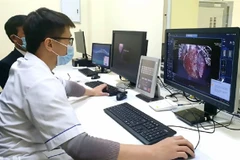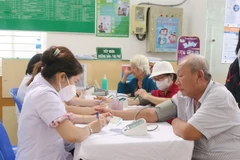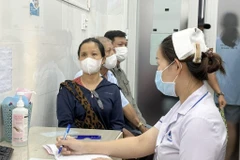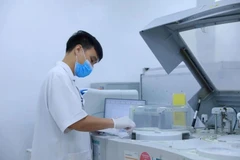 A Binh Dan Hospital pharmacy worker uses paper bags instead of plastic to pack medicines.(Photo: VNA)
A Binh Dan Hospital pharmacy worker uses paper bags instead of plastic to pack medicines.(Photo: VNA) HCM City (VNS/VNA) - At the pharmacy in Binh Dan Hospital in Ho Chi Minh City’s District 3, staff use paper bags to pack medicine instead of plastic.
This is a part of the hospital’s response to the Government’s pledge to rid Vietnam of single use plastic products by 2025 and the Ministry of Health’s call to reduce plastic wastes in the health sector.
Holding a paper bag with medicines, To Nguyen Hue Tram of Thu Duc district, who received treatment at the hospital, said: “It is not inconvenient and I like the paper bag which is environment-friendly.”
To Van Bay of the Mekong Delta province of Long An, who visited the hospital for treatment, was surprised when hospital staff handed him a paper bag with medicines.
“I am willing to take the paper bag because it is good for the environment.”
Dr Mai Ba Tien Dung, chairman of the hospital trade union and head of the andrology department, said many patients are still not familiar with paper bags.
The hospital staff have explained to patients the reasons for replacing plastic bags with paper ones, he said.
Besides, they also encourage patients to use paper instead of plastic cups when drinking water at the hospital, he said.
Paper glasses have been placed by water coolers in the hospital, he said.
“Plastic waste is a consequence of advances in developing convenient medical devices.”
For instance, plastic needles and syringes are made to replace glass ones, but used plastic needles are discarded and grow into large piles of plastic wastes which are toxic to the environment, he said.
The hospital’s pharmaceutical council advises doctors to use medicines that have the same efficacy in place of shots to reduce plastic waste and the cost of waste treatment, he said, adding it also helps reduce the risk of transmission of diseases.
Nguyen Van Truyen, head of administration at the District 11 Hospital, said the hospital uses self-destructing plastic bags for medicines and X-ray films.
It has paper cups near water coolers for patients to use, and plans to organise an event to encourage patients to limit the use and discharge of plastic bags and bottles in the hospital, he said.
“Many patients and their relatives like the convenience of plastic bags and bottles, so it is difficult for them to stop using them.”
The HCM City Oncology Hospital uses paper bags for X-ray, MRI and CT films, and self-destructing plastic bags are used for garbage at the hospital.
In the hospital’s canteens, plastic straws and boxes and foam boxes are no longer used, and have been replaced by glass.
At the Gia Dinh People’s Hospital in Binh Thanh district, patients are encouraged to carry medicines in their own bags because the hospital is reducing and will soon stop using plastic bags for the purpose.
It has stopped using plastic water bottles, cups, dishes and straws at its conferences, meetings and training courses, replacing with paper and glass.
The hospital has installed water purification equipment and paper cups for patients.
Many other hospitals in the city are also carrying out similar campaigns to reduce plastic waste though the costs are admittedly high.
According to the city Department of Health, there are 6,548 health facilities discarding nearly 30 tonnes of solid medical wastes each day including plastic needles, syringes and others.
Speaking in an online meeting to discuss reduction of plastic waste in the health sector last month, Minister of Health Nguyen Thi Kim Tien said the daily activities of health workers, patients and their family members, and professional medical activities such as packaging and storing medicines, chemicals, equipment, and medical materials generate large volumes of plastic waste.
“Most plastic waste is from plastic bags, which is difficult to decompose, and packaging and items used by patients for carrying food and daily items.
"A quick report from some hospitals showed that about 5 percent of medical waste per day is plastic."
According to European Commission statistics, an estimated 8.3 billion tonnes of plastic products were produced by 2018. Around 6.3 billion tonnes have become waste with five billion tonnes accumulating in the environment or buried.
Every year, 4.8-12.7 million tonnes of plastic waste is discharged into the oceans. - VNS/VNA



























